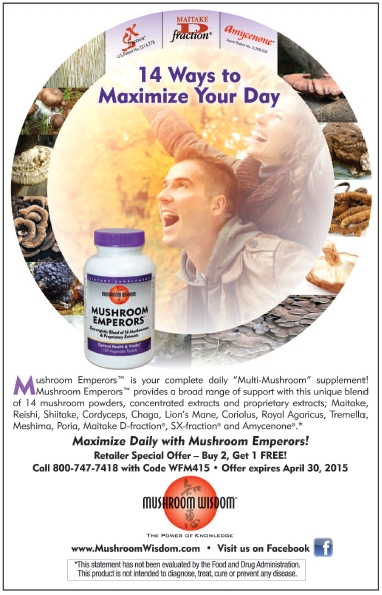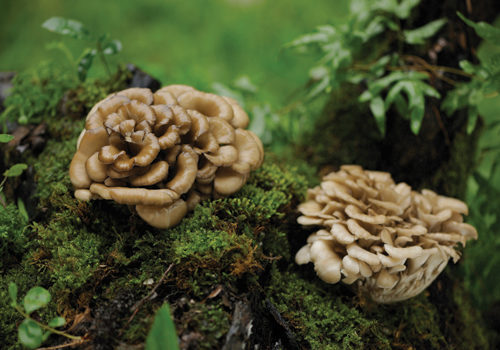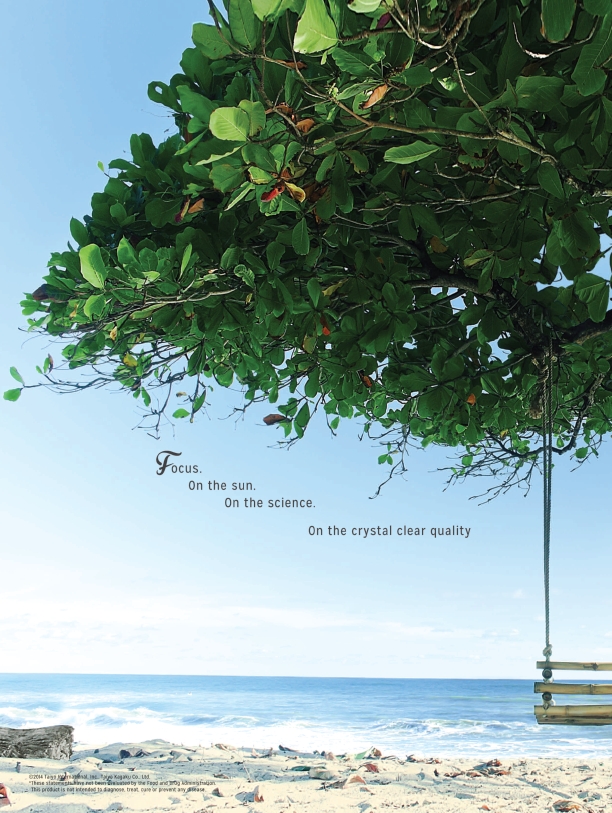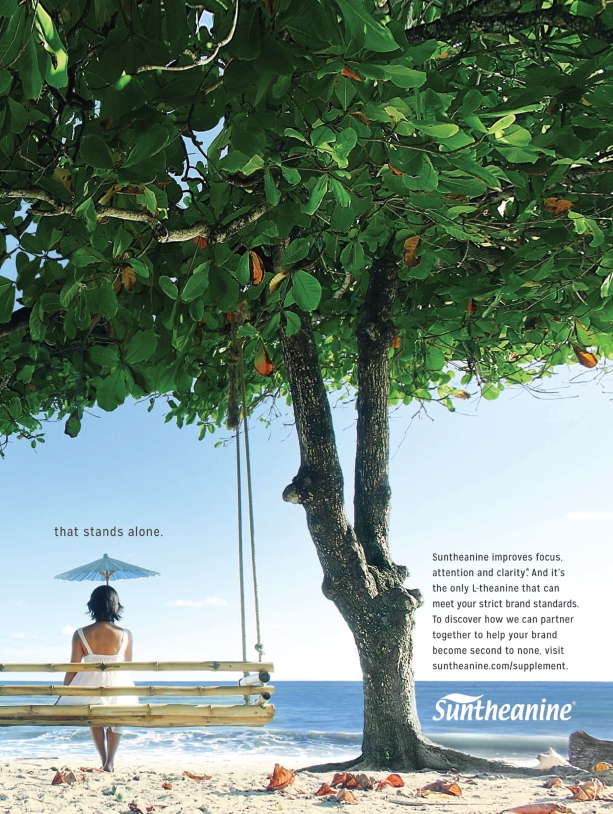The nutritional benefits of mushrooms are widely discussed by health aficionados. Despite all of the benefits of consuming mushrooms during meals, however, these advantages pale in comparison to the health-promoting properties of medicinal mushroom supplements. What is known about these supplements includes thousands of years of traditional use in Chinese and Japanese herbal medicine and the modern research spurred by their reputations. From possible immune health-supporting ingredients to athletic performance enhancers, medicinal mushrooms promote good health in all sorts of ways. Here are just a few of the most promising mushroom supplements on the market right now.
Reishi (Ganoderma lucidum): The Revitalizer
The reishi mushroom is well-known among medicinal mushroom experts to support overall health and vitality. Commonly referred to as the “mushroom of immortality,” it was used thousands of years ago by Taoist monks to attain well-being and longevity (1).
In modern times, researchers have found that the reishi mushroom can have a positive effect in studies on a diverse range of conditions. Some research suggests reishi mushrooms may benefit those with common issues like asthma, allergies, insomnia, anxiety, migraines and arthritis. While the reishi mushroom cannot be said to cure, treat or prevent any disease, its antimicrobial, anti-inflammatory and antioxidant activity may explain some of these research outcomes (2). Despite these various uses of reishi, however, recent studies have focused on two major applications of the mushroom: bolstering the immune system and supporting the cardiovascular system.
Again, mushrooms cannot cure disease, but researchers are investigating their effect on immune system health. According to Memorial Sloan Kettering Hospital, reishi has shown immune-stimulating effects in patients with advanced cancer. It has also been studied for its ability to improve the effectiveness of chemotherapy while diminishing the negative side effects (3). Reishi also has anti-tumor properties, in several studies inducing apoptosis (programmed tumor cell death) and restricting the nuclear transcription factor, which plays a central role in the spread of specific types of cancer (1). These effects were seen in small-animal studies.
In a small-animal study testing the anti-tumor and anti-inflammatory properties of reishi, scientists administered the mushroom’s polysaccharides 24 hours after tumors were implanted in mice. There was an 80.8% reduction in tumor volume and a 77.6% reduction in tumor mass after 10 days of treatment (4). Another study looked at the treatment of human ovarian cancer cells with the mushroom in a lab setting, and found that not only did the vascular endothelial growth factor and spread decrease, but also that these results correlated with the concentration of the mushroom used (5).
Reishi can also benefit the cardiovascular system. It can support healthy cholesterol and blood sugar levels and has shown that it can inhibit platelet collection, lowering blood pressure as well. In a study with hypertensive patients, those taking reishi supplements saw a substantial decrease in whole blood viscosity, blood pressure and plasma viscosity (1). In a study involving mini-pigs, their total cholesterol decreased 20% while their LDL- and HDL-cholesterols decreased by 27% and 18% respectively with the treatment of G. lucidum (6).
Studies on the reishi mushroom will continue to research its effect on these major conditions, among others.
Maitake (Grifola frondosa): The Immune Supporter
Known by the Japanese as the “King of the Mushrooms,” Maitake promotes an overall healthy lifestyle. This large mushroom, a cluster of which can grow up to 20 inches at the base and can weigh up to 100 pounds, can support circulatory and metabolic health. The most intriguing property of G. frondosa, however, is its ability to benefit immune health. Though it cannot treat disease, it has become the focus of many cancer and HIV studies.
Retailers may be familiar with two branded forms of Maitake extract. D-fraction (from Mushroom Wisdom) is made from the beta-glucan protein of the Maitake mushroom. This extract has been researched extensively for its support of the immune system, including supporting healthy cellular immune response, inducing apoptosis and inhibiting carcinogens, tumor growth and metastasis. Like other medicinal mushroom supplements, it also supports chemotherapy while minimizing its side effects (7). In a human clinical trial, results showed that the extract improved the outcome for patients with breast, pulmonary, liver and prostate cancers. When D-fraction was used without chemotherapy, the improvement rates of these cancers were over 70%, 65%, 45% and 40% respectively. When coupled with chemo, D-fraction resulted in over 85%, 70%, 70% and 48% improvement rates (7).
Further research on D-fraction led to the development of SX-fraction by the same company. This Maitake extract is made from a glycoprotein, and is said to support healthy blood pressure and blood sugar levels. In a small clinical study, volunteers with type-2 diabetes took this extract. The patients experienced a 30–63% reduction in blood glucose levels after two to four weeks; one patient’s average fasting blood sugar dropped to 90–100 mg per deciliter from 260 with the help of SX-fraction (7).
Cordyceps (Cordyceps sinensis): The Invigorator
This powerful mushroom is best known for energy support. Interest was first sparked in this mushroom centuries ago when the cattle of Tibetan yak herders became energized after eating it (8). Cordyceps is said to aid in the production of adenosine triphosphate (ATP), which produces energy at the cellular level (2). The effect that this mushroom can have on ATP production can also increase energy levels of athletes to help them get through a long workout and maximize the results of their training (9).
In addition, it promotes cardiovascular health, as it benefits healthy blood flow by helping dilate coronary arteries in the heart. Researchers conducted a study where participants consumed a pre-workout supplement containing Cordyceps for three weeks of high-intensity interval training. The experimental group receiving Cordyceps outperformed the placebo group in almost all categories, including a 10.3% increase in cardiovascular fitness, compared to the placebo’s 2.9% increase, and a 1.2-kilogram increase in lean body mass compared to the placebo’s 0.5-kilogram decrease (10).
Cordyceps has several other health-promoting properties such as benefitting immune and respiratory health (8). Studies have shown that this mushroom supplement can promote respiratory health, including increased oxygen intake and aerobic capacity.
Research also supports the mushroom’s ability to increase libido. Evidence has suggested a positive effect on male sex hormones. Women can also benefit from this mushroom’s stimulation of estrogen production, a factor that can improve fertility.
Turkey Tail: (Coriolus versicolor): Cellular Health Supporter
This mushroom commonly found in North American woods is colloquially referred to as Turkey Tail. C. versicolor is one of the most studied medicinal mushrooms.
Turkey tail contains special sugar molecules, called Polysaccharide K (PSK) and Polysaccharide-Peptide (PSP). Both are beneficial to health, but PSK specifically has shown that it has several anti-cancer properties in studies, though it cannot be said to treat any disease. It was found in studies to boost immune cell production, slow the spread of cancer throughout the body and ameliorate the side effects of chemotherapy and radiation therapy in experiments. When administered along with another form of cancer treatment, patients experienced longer periods of remission and higher survival rates (2). It has even showed merit in supporting the immune system of patients who have undergone cancer-related surgical procedures. PSK is a strong antioxidant that blocks free radicals that could damage cells. It has shown the most effectiveness against stomach, colorectal, lung, oesophageal, nasophonyngeal, breast, cervical and uterine cancers. In a trial involving cervical cancer patients, those recieving C. versicolor saw a 36% reduction in cancer cells compared to 11% for the controls, and their five-year survival rate increased from 48% to 79% (2). Like the aforementioned mushrooms, one cannot say that PSK will cure, treat or prevent disease.
PSP, in comparison, has not been researched as extensively in humans. Early studies have suggested that PSP may protect the immune system from the damaging effects of cancer treatment while enhancing the treatment’s effectiveness, and may also slow the growth of lung cancer and sarcoma. More human trials are necessary to learn the capabilities of this carbohydrate, but those conducted thus far have shown several health benefits (11).
Lion’s Mane (Hericium erinaceus): Cognitive Helper
The Lion’s Mane mushroom is named for its unique appearance, consisting of long, flowing tendrils. Although it has only recently gained popularity in North America, its health benefits have made it a key ingredient in traditional Chinese medicine for hundreds of years (12).
Lion’s Mane has researchers’ interest because of its possible efficacy against degenerative neurological conditions including Alzheimer’s, dementia and Parkinson’s, though more research is needed before it can be said to help these illnesses. Lion’s Mane contains two molecules, hericenones and erinacines, that stimulate the growth of nerve growth factor (NGF) (13). NGF is a protein necessary for the growth of sensory neurons and myelin sheath on brain cells; lower than normal levels of NGF have been linked to the early stages of dementia and Alzheimer’s (8). These shortages of NGF cannot simply be replenished with an injection because NGF cannot pass the blood brain barrier. Hericenones and erinacines, however, have a low enough molecular weight to pass through the blood brain barrier and can then stimulate NGF growth from inside of the barrier (13). One study found that this mushroom’s extract when combined with NGF can produce up to a 60.6% increase in neurite growth (14).
Lion’s Mane’s abilities to stimulate NGF also suggest implications for other degenerative conditions. Although it has not yet proven to regenerate sensory neurons or cure disease, it has shown to help improve neuropathy. In addition, its ability to increase myelination has shown promise in helping MS patients, though more research is needed. It has even suggested to benefit those with conditions of physical degeneration, like muscular dystrophy and nerve injury in general, though more trials must be conducted.
Many mycologists feel Lion’s Mane supports cognitive health, benefits the immune system and supports healthy blood sugar levels (9).
Snow Fungus (Tremella fuciformis): The Beautifier
T. fuciformis, commomly referred to as Snow Fungus, is a white jelly mushroom that has been used by the Chinese to promote beauty for centuries. This mushroom is still used in modern cosmetics, but researchers have discovered the mushroom’s diverse properties that can promote health in other areas.
Tremella is used in an array of topical cosmetic products, especially those related to skin care. The polysaccharides in T. fuciformis retain moisture and can hold more water than hyaluronic acid (2). This makes it a vital ingredient in many skin moisturizers. In addition to helping skin retain its natural moisture, it helps protect the skin, keeping it flat and flexible and preventing senile degeneration of microvessels that allow skin to maintain a flushed appearance (8).
A second popular use of tremella supplements is to promote circulatory health. Research suggests that this mushroom can increase blood clotting time and reduce platelet adherance and blood viscosity, therefore benefitting patients with hypertension, thrombophlebitis and atherosclerosis. Tremella is by no means a cure or treatment for these conditions, though.
The mushroom has been studied to support those undergoing acute radiation, including restoring the blood producing mechanism of bone marrow (8). A study showed that rats’ chromosomal impairment from radiation was reduced from 56.01% to 28.13% with the help of the mushroom, and that the number of micronuclei induced from the radiation decreased from 30.3% to 11.32% (15).
Tremella is also rich in dietary fibers and vitamin D. In fact, this mushroom has a high concentration of natural whole food vitamin D. This increases the absorption of calcium in the intestines and helps maintain bone density. The soluble fibers form a gel-like material along the intestines that help to lower cholesterol.
Whether these supplements are as powerful as research has declared them or not, they undeniably impact health positively. These species of mushrooms are incorporated into several diverse supplements on the market. Each supplement differs in extraction method, whether it be hot water extraction, alcohol extract or a ground powder, which all impact potency. Be sure to speak with your manufacturer about their processing techniques to choose the best ones for your customers. WF
References
1. R. Upton, ed. “Reishi Mushroom: Ganoderma lucidum—Standards of Analysis, Quality Control, and Therapeutics,” Amer. Herbal Pharmacopoeia Ther. April 2006. Print.
2. M. Powell, Medicinal Mushrooms: A Clinical Guide (E. Sussex, U.K.: Mycology Press, 2010).
3. Memorial Sloan Kettering Cancer Center, “Reishi” www.mskcc.org/cancer-care/herb/reishi-mushroom, accessed Feb. 23, 2015.
4. S. Joseph, et al., “Antitumor and Anti-Inflammatory Activities of Polysaccharides Isolated from Ganoderma lucidum,” Acta Pharm. 61 (3), 335–342 (2011).
5. S. Dai, et al., “Ganoderma lucidum Inhibits Proliferation of Human Ovarian Cancer Cells by Suppressing VEGF Expression and Up-Regulating the Expression of Connexin 43,” BMC Compl. Alt. Med. 14: 434 (2014).
6. A. Berger, et al., “Cholesterol-Lowering Properties of Ganoderma Lucidum In Vitro, Ex Vivo, and In Hamsters and Minipigs,” Lipids Health Dis. J. 3:2 (2014).
7. M. Kaylor and K. Babal, Syndrome X and SX-Fraction (Orem, UT, Woodland Publishing, 2003).
8. M. Stengler, The Health Benefits of Medicinal Mushrooms (Laguna Beach, CA, Basic Health Publications, Inc., 2005).
9. “Cordyceps.” Herbs List: A Guide to Medicinal Herbs, n.p. Web. 6 Jun. 2011.
10. A.E. Smith, et al. (15 Feb 2010), “The Effects of a Pre-Workout Supplement Containing Caffeine, Creatine, and Amino Acids During Three Weeks of High-Intensity Exercise on Aerobic and Anaerobic Performance,” J. Int. Society Sports Nutr. 7:10 (2010).
11. “Coriolus Versicolor.” cancer.org. American Cancer Society, n.p. Web. 1 Nov. 2008.
12. L. Alschuler and K.A. Gazella, “Mushrooms: Ancient Healing Wisdom.” Better Nutrition Magazine. 2009.
13. “The Unique and Versatile Lion’s Mane Mushroom,” mushroom-appreciation.com, n.p. Web. 2013.
14. P.L. Lai, et al., “Neurotrophic Properties of the Lion's Mane Medicinal Mushroom, Hericium erinaceus (Higher Basidiomycetes) from Malaysia. International Journal of Medicinal Mushrooms, 5 (6), 539–554 (2013).
15. W. Xu, et al., “Protective Effect of Polysaccharides Isolated From Tremella Fuciformis against Radiation-Induced Damage in Mice,” J. Rad. Res. 53 (3), 353–360 (2012).
Published in WholeFoods Magazine, April 2015











